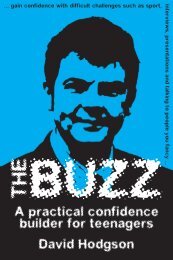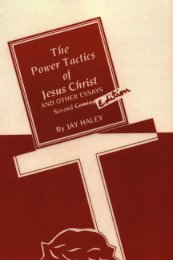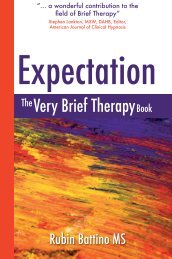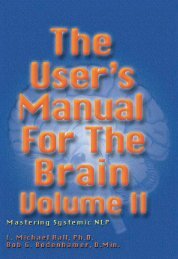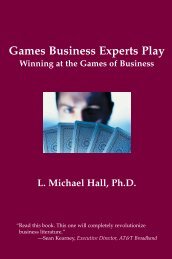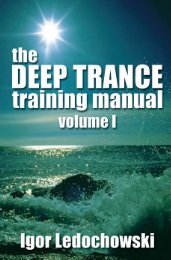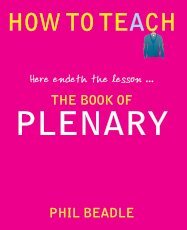meaning
Look Inside - Crown House Publishing.
Look Inside - Crown House Publishing.
- No tags were found...
You also want an ePaper? Increase the reach of your titles
YUMPU automatically turns print PDFs into web optimized ePapers that Google loves.
“Meaning brings Frankl to life in full dimension—his spirit, determination, wisdom, and integrity.”—Jeffrey K. Zeig, Ph.D., Director, The Milton H. Erickson Foundation.<strong>meaning</strong>a play based on thelife of Viktor E. FranklRubin Battino, M.S.
MeaningA play based on the life ofViktor E. FranklRubin Battino, M.S.Mental Health CounselingAdjunct Professor,Department of Human Services (counseling)Wright State University, Ohio, USACrown House Publishingwww.crownhouse.co.uk
Table of ContentsAcknowledgments ....................................................................................... iiiForeword .......................................................................................................... vPreface ........................................................................................................... viiProduction Notes .......................................................................................... xiAct I ................................................................................................................... 1Scene 1 About Man’s Search for Meaning ................................. 3Scene 2 A Selection Process: Camp to Camp ............................. 7Scene 3 Premium Coupons .......................................................... 11Scene 4 The First Phase is Shock ............................................... 15Scene 5 The Bath—Textbooks Tell Lies! ................................... 21Scene 6 Suicide .............................................................................. 25Scene 7 Apathy—The Second Stage .......................................... 29Scene 8 Dreams and Food ............................................................ 33Scene 9 Politics and Religion ...................................................... 39Scene 10 My Wife’s Image ............................................................. 41Scene 11 The Inner Life of the Prisoner ..................................... 45Scene 12 Psychological Factors in the Camps ........................... 49Scene 13 Being a Typhus Doctor and Acting Like a Sheep .... 53Scene 14 The Science Teacher ....................................................... 57i
Act II ............................................................................................................... 59Scene 15 The Size of Human Suffering ...................................... 61Scene 16 Art in a Concentration Camp ....................................... 65Scene 17 Decisions and Escape .................................................... 67Scene 18 Faith in the Future .......................................................... 73Scene 19 After Liberation .............................................................. 79Scene 20 Dr J.’s Story ...................................................................... 83Scene 21 Some Personal Stories ................................................... 87Scene 22 General Philosophy ....................................................... 95Scene 23 Frau Kotek ........................................................................ 99Scene 24 The Science Teacher ..................................................... 103ii
Scene 1About Man’s Searchfor MeaningTitle Board:Visual:Stage Directions:ABOUT MAN’S SEARCH FOR MEANINGIn a lecture hallFrankl; Frankl’s ColleagueFrankl lecturing.There is a lectern for a lecture. Frankl isbehind the lectern and Colleague is stageright commenting.FRANKL: My book Man’s Search for Meaning does not claim to be anaccount of facts and events but of personal experiences, experienceswhich millions of prisoners here suffered time andagain. It is the inside story of a concentration camp, told byone of its survivors. This tale is not concerned with the greathorrors, which have already been described often enough(though less often believed), but with the multitude of smalltorments. In other words, it will try to answer this question:How was everyday life in a concentration camp reflected inthe mind of the average prisoner?FRANKL’S COLLEAGUE (COLLEAGUE): And you presume to speak forthem all, to describe their experiences? You survived, yes.Speak about your thoughts, your survival. Do you thinkanother description will answer that question?FRANKL: Yes. We were separate, we were individual, we madechoices; yet, we were so controlled and confined that at timeswe were just one mind, one body.COLLEAGUE: So tell your tale. On your head be it.3
MeaningFRANKL: Most of the events described in the book did not takeplace in the large and famous camps, but in the small oneswhere most of the real extermination took place. This story isnot about the suffering and death of great heroes and martyrs,nor is it about the prominent Capos—prisoners whoacted as trustees, having special privileges—or well-knownprisoners. It is not so much concerned with the suffering ofthe mighty, but with the sacrifices, the crucifixion and thedeaths of the great army of unknown and unrecordedvictims.COLLEAGUE: You’re reading minds again.FRANKL: Not so, we were one. Yes, it was these common prisoners,who bore no distinguishing marks on their sleeves, whom theCapos really despised. You see, while these ordinary prisonershad little or nothing to eat, the Capos never went hungry.In fact, many of the Capos lived better in the camp than theyhad in their lives.COLLEAGUE: Another paradox.FRANKL: Often these men were harder on the prisoners than werethe guards, and beat them more cruelly than the SS men did.COLLEAGUE: And will you tell their story, too?FRANKL: Perhaps that will come out. These Capos, of course, werechosen only from those prisoners whose characters promisedto make them suitable for such procedures. If they did notcomply with what was expected of them, they were immediatelydemoted.COLLEAGUE: They, too, had choices; or did fear rob them of that?FRANKL: Fear? Fear? Almost a <strong>meaning</strong>less word in the camps.COLLEAGUE: You were afraid.4
Scene 1: About Man’s Search for MeaningFRANKL: Of course. You would need to be crazy not to. But, thesemen soon became much like the SS men and the camp wardens.They can all be judged on a similar psychological basis.COLLEAGUE: Are youjudging? Youwho understoodit all?canunderstand andjudge. That iswhat makes ushuman. To understanddoes notremove the obligationto judge.Or to forgive.FRANKL: YouWednesday Lecture, 1966.Source: Viktor Frankl Institute, Vienna,Austria.COLLEAGUE: Fancy words. I need to hear more.FRANKL: Nietzsche said, “He who has a why to live for can bearwith almost any how.”COLLEAGUE: Fancy thought, nicely phrased. Out of what concentrationcamp did Nietzsche come?FRANKL: You do not have to suffer to learn. But, if you don’t learnfrom suffering over which you have no control, then your lifebecomes truly <strong>meaning</strong>less.COLLEAGUE: You don’t recommendsuffering for learning?FRANKL: Only if it is beyondyour control …Frankl, 1994.End of Scene 15
Scene 15The Size of Human SufferingTitle Board:Visual:Stage Directions:THE SIZE OF HUMAN SUFFERINGDe-lousing. No chimney!Frankl; ColleagueStanding outside in the rain. Campcrematorium. Three photos showingdelousing behind a back-lit sheet. Ladlingsoup.Match visuals to dialogue. Delousing via aseries of slides.FRANKL: A man’s suffering is similar to the behavior of a gas whichwill completely fill any size of empty container. Sufferingcompletely fills the human soul and conscious mind.Therefore, the “size” of human suffering is absolutely relative.Crematorium.Source: Hartmann, E. (1995). In the Camps.61
MeaningCOLLEAGUE: From the loss of a favorite pet to that of a loved one.FRANKL: Yes. It follows that a very trifling thing can cause thegreatest of joys. We were being moved from Auschwitz andwere all afraid that the destination was the Mauthausencamp. You cannot possibly imagine the dance of joy performedin the carriage by the prisoners when we realized wewere “only” heading for Dachau!COLLEAGUE: Only Dachau!FRANKL: When we arrived the first important news was that thiscomparatively small camp—only two thousand five hundred—hadno “oven,” no crematorium, no gas! A person whobecame a “Moslem” would have to wait to be returned toAuschwitz to be killed. We laughed and cracked jokes.COLLEAGUE: It was not all jokes.FRANKL: One of our members was missing and we had to stand allnight and into the next morning, outside, frozen and soakedto the skin. Yet we were all very pleased—no chimney!COLLEAGUE: It was all relative.FRANKL: We envied convicts who had it much better than us. Welonged for a factory job in a sheltered room. All of the outsidework parties were different. Some foremen maintained a traditionof dealing out numerous blows. I was once in such agroup and was saved by an air-raid alarm which made it necessaryto regroup the workers.COLLEAGUE: You were saved by many such strange happenings.FRANKL: We were grateful for the smallest of mercies like enoughtime to delouse before going to bed.COLLEAGUE: How was that done?FRANKL: It meant standing naked in an unheated hut where icicleshung from the ceiling. If there were no air-raid alarm, we had62
Psychiatrist and neurologist, Viktor E. Frankl, was the founder ofLogotherapy, the third Viennese school of psychiatry. It is concernedwith helping people find <strong>meaning</strong> in their lives. He developed thissystem before spending several years in Nazi concentration camps, andafterwards he systematized and popularized it in many books and papers.His book Man’s Search for Meaning has influenced millions of peopleworldwide.Meaning is a biographical play relating the most critical times in Frankl’s life.Much of the dialog is taken verbatim from Frankl’s own writings, makingthis drama almost autobiographical.Illustrated with photographs of Frankl and of relevant locations, Meaningpresents this extraordinary man’s life in a dramatic and readable style. It willappeal to those who know of Frankl’s work, and inspire those new to hiswritings to learn much more about this remarkable man and hiscontributions to humanity.“Meaning transports us across time and through a dimensional gate to personallyvisit with the legendary Frankl. It is an inspirational and moving journey, succinctand yet deeply impactful.”—Carol Lankton, M.A., LMFT, author, and teacher of Ericksonian hypnotherapy.“The passionate and poignant bleakness of this magnificent play paints vivid pictureswith both precision and grandeur. Each person realizes anew, the humanness as wellas the inhumanity of mankind. Frankl’s own words responding to the questions weall still have, gives wiser and more deeply profound understanding to the <strong>meaning</strong>of life, then, now and for the future. Seeing Frankl’s life, in this setting—love and lifejuxtaposed with suffering and death, brings somber joy as we realize once again weall can be free, as Frankl always was.”—Betty Alice Erickson“Here is a gift of love that provides testimony to the dream that the light at the end ofthe tunnel of suffering is not an illusion. Read this and you won’t miss out on a lifeof <strong>meaning</strong>.”—Carl A. Hammerschlag, M.D.Rubin Battino, M.S. has a private practice in Yellow Springs, Ohio. He is AdjunctProfessor for the Department of Human Services at Wright State University, andhas over ten years of experience as a facilitator in a Bernie Siegel style supportgroup. He is President of the Milton H. Erickson Society of Dayton, and wasco-chair of an ad hoc committee to establishcertification standards for training in Ericksonianhypnotherapy. He is Professor Emeritus of chemistry.Psychotherapy/Counseling/Drama£9.99 UK$14.95 USACrown House Publishing Limitedwww.crownhouse.co.uk



